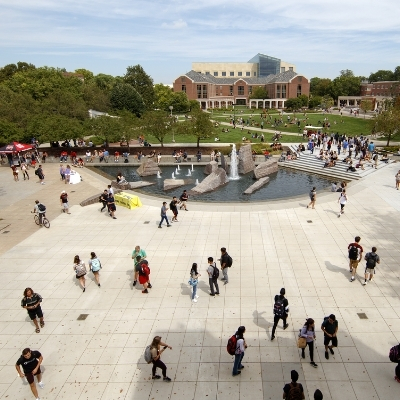Fri, 04/02/2021
The Nebraska Governance and Technology Center (NGTC) has announced the awarding of 5, $10,000 grants across the University of Nebraska, for a total of $50,000 awarded. These Supplemental Nebraska Governance and Technology Center Research Awards will providing additional funding to teams that are already engaged in research projects at the University of Nebraska. The goal of these grants is to facilitate the consideration of law and policy topics related to ongoing research.
The NGTC studies the ever-changing relationship between law and technology – how the law can regulate technology and how new technologies affect what the law can do. As Professor Gus Hurwitz, the founder and Menard Director of the Center explained, “much of how our society operates is structured around how technologies work, often through legal and policy mechanisms. Studying the relationship between the technologies that shape our society and the legal and political structures that result (that is, technology governance) is a fundamentally interdisciplinary endeavor.” As such, the selected projects come from a variety of colleges and disciplines.
The teams that have been selected to receive the supplemental awards are as follows:
-
Law and Policy Analysis of AI-Driven Health Technologies led by Ming (Bryan) Wang from the College of Journalism and Mass Communication. Other team members on this project are Dr. Mohammad Hasan, Department of Computer Science & Engineering, and Dr. Kelly Cawcutt, Division of Infectious Diseases and Pulmonary & Critical Care Medicine at UNMC.
-
Legal Challenges Impeding State DOT Investment in Connected and Automated Vehicle Technologies led by Dr. Cody Stolle, with contributions from contributions from Ricardo Jacome and the faculty and staff of the Midwest Roadside Safety Facility, a non-profit academic research institution at UNL and part of the umbrella of the Nebraska Transportation Center.
-
Linking Policy, Land Use Land Cover Change, and Weather and Climate in Nebraska led by Dr. Rezaul Mahmood, School of Natural Resources, Public Policy Center Dept. of Agricultural Economics, with team members Tarik Abdel-Monem, Lilyan Fulginiti, and Richard Perrin.
-
Public Insights Lab at the College of Journalism and Mass Communication, led by Professor Valerie Jones.
-
Electrified Transportation Initiatives in Nebraska, led by Dr. Moe Alahmad, an Associate Professor in the Durham school of Architectural Engineering & construction, with support from Ahmad Almaghrebi, Subhaditya Shom, Kevin James, and in conjunction with the Nebraska Community Energy Alliance.
The goal of NGTC Supplemental Research Awards is twofold: in the near term, to encourage researchers developing new technologies to consider potential policy aspects of their research and, in the longer term, to facilitate new interdisciplinary collaborations.
The NGTC hopes to continue to support University of Nebraska researchers again in the future.
Interested groups can learn more on their website ngtc.unl.edu or contact the executive director, Elsbeth Magilton at elsbeth@unl.edu.
Information for future submissions:
Projects must be suitably technology related and articulate how law and policy intersects with the existing project. Note, these supplements are not meant to provide funding for legal counsel (legal advice, patent filing, etc.). Successful statements of interest will explain how they will integrate consideration of legal and policy issues into the project itself, how the funds will be used to support that goal, and expected outputs.
Statements will be reviewed by the Center’s Director, Executive Director, and core faculty as a committee. Those selected from the statements of interest will be asked to submit a full proposal in February.
Statements should be less than 800 words and briefly describe the existing project, current funding, timeline, research team members, and how the supplement award would be used.
Up to five $10,000 awards will be made in a cycle, with the supplemental activities concluding by December, with final reporting in January. There are no indirect (F&A) costs paid from the supplement, and it should all be used for direct costs.
Tags: Center News
